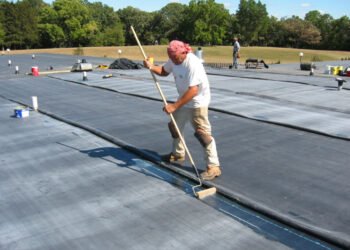Do you ever find yourself standing on one side of a room and wondering why it feels so much colder than the other? Or maybe there’s been an increase in your energy bill lately, and you don’t know the cause. If either of these situations sounds familiar, then you may need to look into getting a moisture barrier for your home. This article will explore everything about moisture barriers, from how they can protect your home from water damage and mold growth to how to get the mold removal service you need when you already have a problem.
Let’s start by first understanding what a moisture barrier is.
What Is A Moisture Barrier?
A moisture barrier is an impermeable material that protects your walls and floors from accumulating moisture, which can lead to mold growth, water damage, and other structural problems.
This material is also called a vapor barrier or a water barrier, and it is most commonly found in attics, crawlspaces, and basements.
The moisture barrier is made of a sheet of plastic or other moisture-resistant material that is placed between the drywall and the insulation in these areas.
Now that you know what a moisture barrier is, let’s move on to why you might need one.
Why Do You Need A Moisture Barrier?
Here are the main reasons why you should consider getting a moisture barrier for your home.
Mold And Rot Prevention
When moisture seeps through your walls and ceilings, it can ultimately reach the wooden features such as those for structural supports, which can lead to mold growth and eventually rot.
The rot can affect your home’s structural integrity. In addition, mold growth is also a health hazard and can cause respiratory problems.
Termite And Pest Prevention
Several pests including termites thrive in wet and humid conditions. This is why having a moisture barrier installed in your home will help you keep these pesky pests at bay. If allowed to thrive without control, termites can cause extensive damage and even collapse of your home.
Signs of Termites Damage include hollow-sounding timber, discarded wings near doors or windows, and mud tubes along walls. Regular inspections by professionals can detect termite infestations early, preventing costly damage to your property. Proper ventilation, sealing cracks, and reducing moisture around your home are crucial steps in termite prevention.
Humidity Control
A moisture barrier helps keep the humidity level in your home at an acceptable level. Humidity usually occurs when outside air enters your home, and condenses on the cold surfaces of walls and floors. Having a moisture barrier will reduce moisture seepage and eventual condensation, thus helping keep the humidity level in your home at a comfortable level.
Areas Prone To Moisture
Crawl spaces and basements are especially prone to accumulating moisture and are thus the most common locations for installing a moisture barrier. Besides crawl spaces and basements, ceilings, floors and walls behind showers and baths should also have moisture barriers as well.
Concrete Floors
A moisture barrier is also a must for all concrete floors, especially those in basements. You need a protective moisture barrier between the concrete and the flooring, such as hardwood or tile, to prevent any moisture seepage which can ruin your floors.
Unfavorable Climate
Do you live in an area that snows, rains a lot, and/or has very high levels of humidity? Then having a moisture barrier installed in your home is highly recommended. This will keep your home safe even in the most unfavorable of conditions.
Energy Efficiency
Finally, having a moisture barrier installed can also help reduce your energy bill. Moisture barriers prevent seepage of air from outside to inside the house, thus making it easier to maintain the inside temperature.
Classes Of Moisture Barriers
Now that you know why you need a moisture barrier, let’s look at the different types of moisture barriers available in the market.
There are three classes of moisture barriers – Class I, II, and III. All three classes provide protection against moisture and humidity but differ in their level of performance and the materials used for their construction.
Class I
Class I moisture barrier is the most effective barrier class and is made from impermeable materials such as rubber, sheet metal, glass, and polyethylene sheets.
Class II
Class II moisture barrier is made from semi-permeable materials such as bitumen-coated kraft paper, 30-pound asphalt-coated paper, extruded polystyrene, and plywood.
Class III moisture barrier is the least effective of all three classes and is usually made from permeable materials such as fiberglass insulation, gypsum board, board lumber, and concrete block.
Having a moisture barrier installed in your home is essential to help prevent mold growth, termite and pest infestations, and excessive humidity levels. There are three classes of moisture barriers available – Class I, II, and III – with each providing different levels of protection against moisture. It is important to understand the differences between these classes in order to choose one that best suits your needs.












